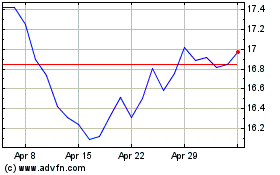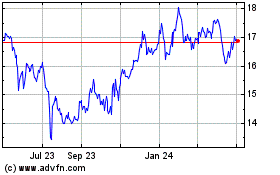Antitrust Chief Vows to Cut Merger Review Time
September 25 2018 - 3:50PM
Dow Jones News
By Brent Kendall
WASHINGTON -- The Justice Department's antitrust chief is
pledging to significantly cut the length of time it takes to review
proposed mergers, amid complaints from companies that the
regulatory clearance process has become painfully slow.
Mergers increasingly take longer to review and clear, Assistant
Attorney General Makan Delrahim said Tuesday in a speech at
Georgetown University. "I agree that it is a problem."
Mr. Delrahim said the department would aim to resolve "most" of
its merger investigations within six months after companies submit
their paperwork, provided the would-be merger partners provide the
relevant data and documents early in the regulatory process.
The department won't drag out its decision-making deliberations
once it has the information it needs to determine whether a merger
is a threat to competition, Mr. Delrahim said.
There will be exceptions to the timeline because some deals
present knotty issues that can't be resolved in a six-month period,
he said. And companies, he added, sometimes want to give the
government extended time.
"If the goal of the business community is a shorter review,
however, we share that goal," Mr. Delrahim said.
Mergers valued at more than $84 million that meet certain
conditions, and all deals valued above $337 million, need
government approval before they can be consummated.
The overwhelming majority of mergers raise no antitrust issues
and are approved within 30 days of paperwork being submitted to the
government. In a small percentage of deals, however, the government
makes a so-called "second request" for information about the
transaction, a move that triggers a full investigation that can
take a year or longer to resolve.
The average duration of significant U.S. merger investigations
has been about 10 months in recent years, according to data
compiled by the law firm Dechert LLP.
Various factors have contributed to the length of the review
process, including the ever-growing quantity of electronic data and
documents that companies produce in the normal course of business
and that government enforcers must sift through. Some mergers are
also reviewed by foreign antitrust agencies, which can slow the
process.
While companies want to reduce regulatory burdens, consumer
advocates want antitrust officials to thoroughly vet potential
concerns about mergers and to build strong legal cases against
problematic deals that can succeed in court.
Mr. Delrahim said the Justice Department's efforts at greater
efficiency would include a willingness to meet with business
executives earlier in the merger review process. He also said the
government would take steps to ensure that third parties with
relevant information about a merger comply with civil subpoenas in
a timely manner. Those third parties often include competitors and
customers of the merging companies.
The antitrust chief also said the Justice Department was
withdrawing a policy guide issued during the Obama administration
on what remedies the government would accept to address concerns
that a merger would harm competition. That 2011 guide expressed an
openness to accepting commitments from companies to limit certain
business conduct after they merged.
Mr. Delrahim, since taking office last year, has said repeatedly
he doesn't favor such remedies, preferring that companies sell off
parts of their businesses that raise antitrust problems. Those
views factored into the Justice Department's lawsuit last year
challenging AT&T Inc.'s acquisition of Time Warner, a case the
department lost in June and is now appealing.
While AT&T had been open to accepting some temporary
restrictions on its postmerger conduct, it firmly resisted any
asset sales, contending that none should be required to secure the
government's approval.
The Justice Department shares merger authority with the Federal
Trade Commission, an independent agency with a bipartisan mix of
commissioners -- and a Republican majority.
FTC Chairman Joseph Simons, speaking later at the Georgetown
event, said he was unaware of the specifics of Mr. Delrahim's plans
for DOJ, but agreed that "the goal is definitely to reduce the time
it takes." He said the FTC planned to start compiling its own
statistics on the length of the merger review process and the
reasons for it.
Separately, Mr. Simons, who became chairman in May, again sent
signals that he plans to run an active enforcement regime at the
FTC. His lunchtime remarks cited empirical studies that suggested
under-enforcement of the antitrust laws and diminished competition
have produced higher levels of economic inequality.
The FTC is holding a series of hearings this fall on whether
antitrust laws and enforcement priorities need adjusting in light
of changing economic trends and business practices.
Write to Brent Kendall at brent.kendall@wsj.com
(END) Dow Jones Newswires
September 25, 2018 15:35 ET (19:35 GMT)
Copyright (c) 2018 Dow Jones & Company, Inc.
AT&T (NYSE:T)
Historical Stock Chart
From Mar 2024 to Apr 2024

AT&T (NYSE:T)
Historical Stock Chart
From Apr 2023 to Apr 2024
